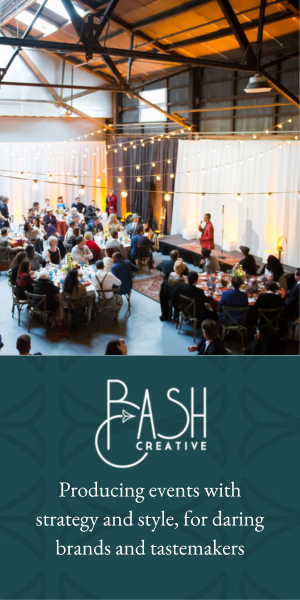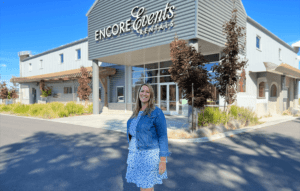Tiwa Ogunlesi is a confidence coach and the Founder of Confident and Killing It. In her own words, the company is a purpose-driven media organization that is all about waking people up to their worth, helping them master their minds, believe in themselves and show up in the world. In this interview for Follow the Founder, Tiwa talks about her journey with confidence and entrepreneurship and gives advice on finding our power as individuals and Founders.
Discovering Confidence
Tiwa comes from a long lineage of strong females (more about this in her Founder Story). Despite that, her inner dialogue as a teenager was clouded with self-doubt. Even if the pressure wasn’t there, there was an image to live up to. Hence, the struggle with self-perception, confidence, and self-belief fueled by societal pressure and the media was not alien to her.
So how did she overcome these challenges? Tiwa tells us about her journey with building confidence.
“In chapter one of my book “Confident and Killing It”, I talk about your power circle. This is where you are your most confident self. It’s the intersection of your strengths, your passions, and your values. If you want to show up more in the world, you have to know who you are and how you want to show up. If you’re unsure about your identity, if you’re insecure about yourself, you’re most likely going to shrink and hide. You’re not going to go and be actively visible.”
For many people, embarking upon a journey of self-discovery is scary and overwhelming. Where do we begin? How do we approach the problem of breaking through the wall of false beliefs about ourselves and others that society has worked so hard to shape? Tiwa gives us some helpful and tangible advice here.
“It starts with a good level of self-awareness. To embrace your worth, you need to know who you are. You need to know what you represent. You need to know what matters to you.”

“The starting point is to connect with your true, authentic self. What are you good at doing? What comes naturally to you? What are you passionate about? What sets your heart on fire? What do you enjoy talking about? What matters to you? What do you deeply care about? When you mix all of those things together, and you have a real great awareness of that, you’re more confident in yourself. Then, naturally, you start to take steps to show up and speak up more. After you’ve done that, next, I would advise asking yourself, ‘What do you want to be known for? What’s your message? What’s that purpose statement, the thing that you deeply care about?’ It all starts with having those day-to-day conversations with yourself.”
Putting all this work pays off. The reward is not only a more confident self. Knowing who you truly are opens up doors to other avenues and opportunities. It can shine light on your purpose for others to see too. This opens doors to collaboration and aligns opportunities on the path of least resistance to your success. Being on that route doesn’t imply hard work won’t be needed or that the path may become muddy along the way. Tiwa’s advice is to start small.
“I didn’t just find my purpose, and then all of a sudden became a speaker at the biggest stages in the world. It wasn’t like that at all. I was sharing it with friends. Then I shared it online. Before I knew it, it was building communities, and building momentum. You have to take it step by step before jumping to the finish line. Oftentimes, people who feel like they have a message want to be invited to the highest of places to share it for them to feel like they’re good enough or that the message matters enough. It doesn’t work like that. Share with the people around you. Share it with strangers on the street. Share it online, and as you do that, you’ll begin to build your profile as a thought leader, and then the opportunities will come to you to make it easier for you to speak up and show up. But before that, you have to put in a lot of work to intentionally share the message yourself.”
The Power Community and The Myth of Readiness
For Tiwa, one of the biggest points of support has been her community. This extends beyond her circle of family and friends. The people she connected with online by sharing her ideas and beliefs played an integral role in the inception of Confident and Killing It.
“A lot of people are scared to launch their businesses because they think no one will care about their products or services. But I was quite lucky because when I started to talk about confidence and so on social media back in 2016, I got a huge response from women and girls, thanking me for what I was saying. This deeply inspired me.”

“When I came on the scene and started talking about the importance of believing in yourself, knowing who you are, and taking up space, it was a refreshing message that women don’t often hear. I asked myself, how can we change the media landscape where messages of love, positivity, and power are the norm rather than the exception? I received great feedback. I was reassured my messages were the kind of thing that everyone needed to hear, but no one ever talked about. And this was the whole point of Confident and Killing It.”
Without the opportunity for feedback and positive reinforcement, Tiwa might have taken longer to pursue the path she is on now. It helped her build her own confidence as an entrepreneur and build up that readiness we need to start our own venture. Of course, she wasn’t aware of this when she initially started sharing her message. Her motivations were different.
“I started doing it because I noticed that there was a generational cycle of low self-esteem in women and girls. It almost seemed that being insecure was a rite of passage. No one ever talked about women being confident. Every time I was around girls in school, it felt like the Insecurity Olympics. We were fighting over who was the most insecure, who hated their body the most, who was the biggest size, etc. There were never conversations about how amazing we are or about our dreams and our goals.
All this, even though seemingly unrelated at first, was the inspiration needed to spark the inception of Confident and Killing It and put Tiwa on the right path.
“One thing I always recommend to other entrepreneurs is to co-create with their audience. You know, you never want to build in a silo. Before I even created my first ever video on social media, I was working as a youth leader behind the scenes for almost a year, where every Friday night, I would go and hang out with 15- to 17 year-old girls, and I would talk to them, I would mentor them. So before I even got to the point where I was launching Confident and Killing It, I had been doing user research for one year in the basement of this youth center, speaking to these teenage girls as part of our local church. So I always say, co-create with your audience. Get feedback, ask people questions, and build with them. I often ask what content would people like to see or what’s something they are finding challenging at the time. I’m constantly trying to talk to my community and create content in response to their needs.
“When you share your ideas and talk about what you’re doing, you’re planting seeds. You never know what information that person has that can help you, or you never know whether that person needs exactly what you’re offering. So many amazing opportunities can be unlocked when you share without the expectation that everything has to be perfect.”
Taking steps forward, no matter how small, always works in our favor as those small steps accumulate over time. Waiting to be ready to launch our business, our podcast, or whatever we might want to do, will only waste time and increase our fear of failure. We’re never ready to jump in the cold water. Yet, when we do, we often find that it’s not as cold as we expected.
“I try not to wait for perfect moments or to have everything that I need before I get started. I don’t wait for that feeling of readiness. That’s just a way that perfection creeps up for a lot of entrepreneurs and stops them from pursuing their goals and dreams.
“The idea that readiness will start when everything else is perfect is an illusion. Readiness comes after you start. Taking action is what builds that momentum.
“Before I quit my full-time job, I wasn’t ready to be an entrepreneur. I became ready when I quit, and I started to build my business. I’m trying to not let this idea of ‘I’ve been doing this for seven years now, I’ve not allowed any errors’ stop me. Because seven years is not that long in the grand scheme of things. So I’m allowed to experiment as much as I want to.”

If we get everything right, we’re not learning, we’re not growing. As a Founder, it is imperative to continue to push, learn, and grow so we don’t become complacent or stagnant. Inevitably when those opportunities do not show up, we need to take action to create them.
Create Your Own Opportunities
To close off the interview, we ask Tiwa about advice she would give to founders, aspiring entrepreneurs, and generally anyone needing that push of confidence for one reason or another.
“I watched a play in my early 20s, and in it, the lady said, I reject all limitations on my life’s expectations. And it’s just one of those things. I know what I’m capable of doing, and whether the world believes women should be equal or not, or whether the world wants to give space for women, I’m not going to wait for the world to create space for me. I’m going to show up and take the space that I know I deserve. So that’s kind of how I’ve always approached it. I’ve never waited for people to give me permission to take up space. I just use my voice, and I know my story and I know my worth, and I just go for what I want, really.
“If people don’t give you opportunities, how can you create your own opportunities? This is the number one piece of advice I would give Founders. A lot of the time, you’re going to face rejection, you’re going to face failure. People are going to pull the rug from right under your feet, especially after they promised you the world. And if people aren’t rating you like you want to be rated, or acknowledging the skills and the talents that you have. Are you just going to accept it, or are you going to do something about it?
For more inspiring stories, tips, and tricks on entrepreneurship, follow us on Follow the Founder. You can also find us on Instagram or LinkedIn.
Want to Keep Reading?
Confident and Killing It: Tiwalola Ogunlesi
An empowering, practical guide to overcoming imposter syndrome, getting sassy with negative thoughts and succeeding in all areas of life.































